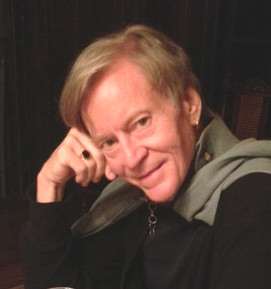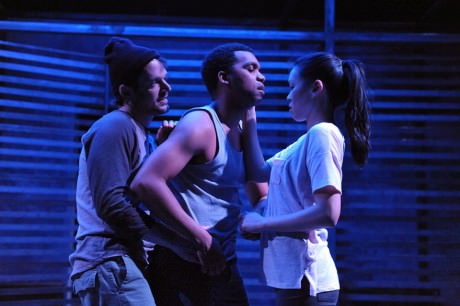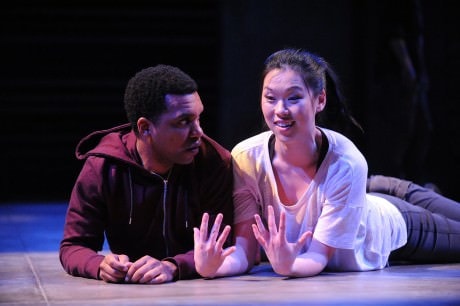
Robert Michael Oliver and John Stoltenberg saw and wrote about the same opening night performance of Lights Rise on Grace at Woolly Mammoth Theatre Company, but they seem not to have seen the same play. Or more accurately: Their attention was drawn to two very different aspects of the play.
Robert Michael wrote in his DC Theater Arts review that “the sheer complexity of [the play’s] design and the psychological implications that design inspires have us wanting more” but that “[u]nfortunately, Lights Rise on Grace does not deliver its promised rich exploration.”

John wrote in his Magic Time! column that he was impressed by the play’s “depiction of eroticism,” which he found “so intimate and artful that it left me woozy with awe and wonder.” During a particular scene expressing that eroticism, he said, “it is as if we the audience are embraced into an empathic understanding of three character’s interior lives at a depth that theater rarely plumbs.”
Michael found it wanting; John found it overwhelming. They agreed to compare notes on their different takes in a written conversation.
John: You took issue with the verisimilitude of the playwright’s prison scenes. That point fleetingly crossed my mind during the performance as well. I was aware that the playwright was taking a number of liberties for narrative convenience, and I chalked it up to the story theater form he had chosen, so it didn’t impede my appreciation of the work. Plus I was tracking what was going on in the sexual, relational character arcs, which I found fascinating, probably to an extent that mooted plausibility questions. But your review made me really interested to know more about where your critique was coming from. You wrote:
From my point of view, the play suffers most from its portrayal of prison as a transformational environment: to be sure, prison reduces humans to their most basic. As a child and teenager, I was raised on the grounds of a prison, and viewed first hand the cruelty of prisons and prisoners alike. Violence, and the threat of violence, permeate the place.
You were raised on the grounds of a prison? Would you say more about that? And how did it inform your view of how the playwright portrays how Large and Riece did time?
Michael: Prison—particularly the maximum security prison—is a totalitarian state, where rules govern every aspect of existence. Given the violent nature of their crimes, both Large and Riece were in such a place. The rules are there to protect convicts and guards alike, because desperate conditions lead to desperate acts. No doubt, men in prison can still long for tenderness, but in such a place the need for tenderness would be viewed as a weakness, not a strength. The playwright focused on the sexual love that developed between Large and Riece during their time in prison, a love that transformed both men. That’s why I later spoke of the playwright using prison metaphorically: because in prison, where power is king, love must remain hidden.
Ironically, both men were in prison because of their violent reaction to questions of their sexual identities. Large lived in an abusive homophobic household that ridiculed his gentle personality; he tries to kill his brother when the brother challenges his manhood. Seemingly, Riece was sexually molested as a child (an act he never really deals with) and, thus, attempted to kill a john who touched him. Though portrayed visually, this transformation of the men’s sexual orientations was left unexplored by the playwright. When I said that I wanted to know more, this is an example of what I meant: given Large and Riece’s radical transformations, I wanted more psychological depth. As a result, I found the eroticism, although artful and interesting in and of itself, a distraction from the full realization of the narrative. In other words, given the context governing the characters’ lives, the eroticism paled. Was there something in particular about the script that allowed you to appreciate the eroticism despite its rather tragic surroundings?

John: I like when I’m watching a new play and I have the feeling that the writer doesn’t have any idea where it’s going to go. The writer doesn’t know what the story is going to be, and the writer doesn’t know how the characters will change during the story. The writer is improvising from moment to moment and basing choices about what happens next on what just happened and what backstory elements just popped into the writer’s imagination. All that the writer has predetermined is to make up the play as she/he goes along the best she/he can (meaning: so that it captures the writer’s own empathic attention). The result for actors can be a very playable score that invites invention and emotional “filling in” moment to moment, and the effect for the audience (i.e., me) is a sense of suspenseful engagement not unlike the experience of watching actors doing actual improv.
I got exactly that sense watching Lights Rise on Grace unfold. The writer seemed to have begun with a deliberately provocative mixed-race casting setup and then vowed to steer clear of every stereotype or cliché that such a setup might suggest. Light Rises felt to me like a theater game, in other words—a very well played one. So for me the way the eroticism emerged—beginning with that wonderfully tender and tentative and comic meeting between Grace and Large, and as embodied from then on in the three actors’ extraordinary performances—was for me the hook that I quickly learned I could trust as it became an ever more fascinating and involving throughline in how the characters’ lives intersected. So for me the play seemed to be about the characters’ erotic interrelationships from the get-go. I think that’s why by the time the bodies of all three actors converged in that choreopoem I quoted in my column, I was blown away. What had been going on between the characters sexually had already claimed my focus, and now suddenly there was a metaphorical convergence of everyone’s.
Incidentally, Chad Beckhim’s stage directions do not indicate that the three actors perform that choreopoem with their bodies entwined as they are in the Woolly production. That choice—a brilliant one in my estimation—appears to have been Michael John Garcés’s idea. If this had been stage combat, there would have been a fight choreographer. But this was stage eroticism (quite a burst of ebullient tactility actually)—and there was no “affection choreographer” beyond the director and three amazing cast members.
I totally get your point about the writer’s use of the prison scenes, which I would agree were opportunistic as you describe, though I don’t recall needing to know more about the biographical precursors to the sexualities of the characters than what Beckhim lets us know. You mention the backstories of abuse in the lives of Large and Riece. I think Grace too bears some scarring of her sexuality—implicitly though not as explicitly—simply having growing up female in the Asian-American culture and family she did. I certainly think evidence of such damage can be inferred from the dramatically self-destructive way Grace throws herself into having sex with lots of men after Large suddenly and inexplicably disappears.
What I’m coming around to saying—in this very roundabout answer to your question!—is that if the performances are as compelling and credible to me as they were in Light Rises, my habit of mind is to take in the text’s bits of backstory information through the embodied interpretations (i.e., not the other way around). For me if the performances seem fully realized and in sync, I’m not noticing lacunae in the script. I’m going on trust (or suspension of skepticism) that the actors have found their way using the information they were given, and I don’t feel obliged to overthink or rethink whether their choices were adequately founded.
Does that answer your question? If it does—and if my explanation is persuasive (and I’m not asking you to share my view)—what do you think might be the lesson here for theater in the larger (and original) sense of “seeing place”? From your and my respective seats in the same “seeing place,” Woolly Mammoth, we saw Light Rises on Grace two very different ways (equally cogent and comprehensible, I would argue, but definitely not the same). That happens among critics in this town all the time, of course. I’m interested in the conversation we’re having here for the light it might shed on that phenomenon—or perhaps it might at least raise the question of how and whether different critical perspectives can ever be in a meaningful dialogue that would be of value to theater artists and audiences. What do you think?

Michael: Your response to the improvisational qualities of Light Rises on Grace immediately had me thinking of my responses to a more absurdist style of theatre. When the expectations are established from the get-go that the theatre piece is rooted in imaginative leaps, I am much more willing to accept a wide range of possible, even implausible events that might follow. With Grace, however, rooted as it was in “reality,” I found myself from early on wanting to know more about how such dramatic identity shifts could take place.
Grace is presented as an extremely shy 16-year-old; after Large’s disappearance she starts having unprotected sex with random men in dangerous places. And then that behavior disappears from the story. I agree with you that there is little doubt that she had an abusive upbringing. And her transformation is remarkable, but I wanted to know more about her transformation. And the play’s title would indicate that the playwright wanted us to focus on her as well; but I think the play lost her as a focus.
At 16 she discovered bliss in Large’s erotic embrace, but I dare say she probably never experienced that bliss again. By the time she and Large reunite, Large is a totally different person, unable to share with her his feelings, his body, his being. Prison has transformed him in so many ways. Riece says near the end of the play that Large has become rougher in his sexual practices. Has Large become rougher with Grace as well? We do not know. The story’s focus has shifted. We do not even experience the moment that Grace is told about Large’s betrayal, as her back is to us. Yet, she is the one on whom the light falls at play’s end. Her acceptance of her situation is also remarkable, but I found myself too much in the dark about who she was to experience her light and its acceptance of single motherhood.
And just to show how my mind works, even Riece’s presence at the end does not provide comfort, as “reality” intruded into the play’s lyricism. As a child sexual abuse victim, he needs desperately to come to terms with that abuse: recognize it and heal. Without that healing, the chances are extremely high that he will act out his emotional damage again and again. Thus, for me, the end had an ominous overtone.
Perhaps, the differences in our reactions to the production lie in the differences between the lyrical and the narrative. For me, the script’s strength lay in its lyrical dimensions; the eroticism resided there, as did its use of discordance, community voices, dramatic tableaux, and psychological fragments. The script’s weakness is its under-illuminated narrative, which results, I think, in a loss of focus. The narrative begins with Grace, and it ends with Grace, but in between we lose too much of her story.
John: You make a very strong case that the script’s storylines were under delineated, which curiously I can give full intellectual assent to without diminishing my emotional response to Light Falls on Grace. But I do agree with your characterization of the ending. I called it “beautiful/sad,” though yes it has an ominous overtone: Much as we might want things to work out for Grace, there is no certainty they will. I also think you are correct in distinguishing the lyrical and the narrative dimensions of the play. It appears we both admired the lyrical—which I don’t think was evident when we began this conversation! Whereas you found the narrative flawed, I was not bothered by it. Indeed I was quite taken with what seemed to me to be evocative but what I hear you saying was sketchy.
This has been a very informative and interesting almost-meeting of minds! :)
Running Time: 90 minutes, without an intermission.
Lights Rise on Grace plays through April 26, 2015, at Woolly Mammoth Theatre Company – 641 D Street NW, in Washington, D.C. For tickets, call the box office at (202) 393-3939, or purchase them online.
LINKS
John Stoltenberg’s review of Lights Rise on Grace on DCMetroTheaterArts.
Robert Michael Oliver’s review of Lights Rise on Grace on DCMetroTheaterArts.





